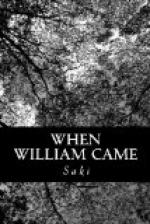between the vote-mongers and the so-called ‘scare-mongers,’
and their verdict was for the vote-mongers all the
time. And now they are bitter; they are being
punished, and punishment is not a thing that they have
been schooled to bear. The taxes that are falling
on them are a grievous source of discontent, and the
military service that will be imposed on them, for
the first time in their lives, will be another.
There is a more lovable side to their character under
misfortune, though,” added the young clergyman.
“Deep down in their hearts there was a very
real affection for the old dynasty. Future historians
will perhaps be able to explain how and why the Royal
Family of Great Britain captured the imaginations
of its subjects in so genuine and lasting a fashion.
Among the poorest and the most matter-of-fact, for
whom the name of no public man, politician or philanthropist,
stands out with any especial significance, the old
Queen, and the dead King, the dethroned monarch and
the young prince live in a sort of domestic Pantheon,
a recollection that is a proud and wistful personal
possession when so little remains to be proud of or
to possess. There is no favour that I am so often
asked for among my poorer parishioners as the gift
of the picture of this or that member of the old dynasty.
’I have got all of them, only except Princess
Mary,’ an old woman said to me last week, and
she nearly cried with pleasure when I brought her
an old Bystander portrait that filled the gap in her
collection. And on Queen Alexandra’s day
they bring out and wear the faded wild-rose favours
that they bought with their pennies in days gone by.”
“The tragedy of the enactment that is about
to enforce military service on these people is that
it comes when they’ve no longer a country to
fight for,” said Yeovil.
The young clergyman gave an exclamation of bitter
impatience.
“That is the cruel mockery of the whole thing.
Every now and then in the course of my work I have
come across lads who were really drifting to the bad
through the good qualities in them. A clean combative
strain in their blood, and a natural turn for adventure,
made the ordinary anaemic routine of shop or warehouse
or factory almost unbearable for them. What
splendid little soldiers they would have made, and
how grandly the discipline of a military training
would have steadied them in after-life when steadiness
was wanted. The only adventure that their surroundings
offered them has been the adventure of practising mildly
criminal misdeeds without getting landed in reformatories
and prisons; those of them that have not been successful
in keeping clear of detection are walking round and
round prison yards, experiencing the operation of a
discipline that breaks and does not build. They
were merry-hearted boys once, with nothing of the
criminal or ne’er-do-weel in their natures, and
now—have you ever seen a prison yard, with
that walk round and round and round between grey walls
under a blue sky?”




